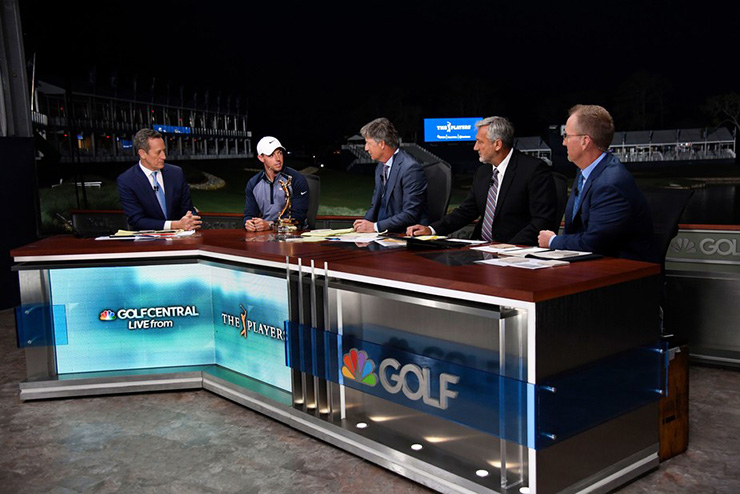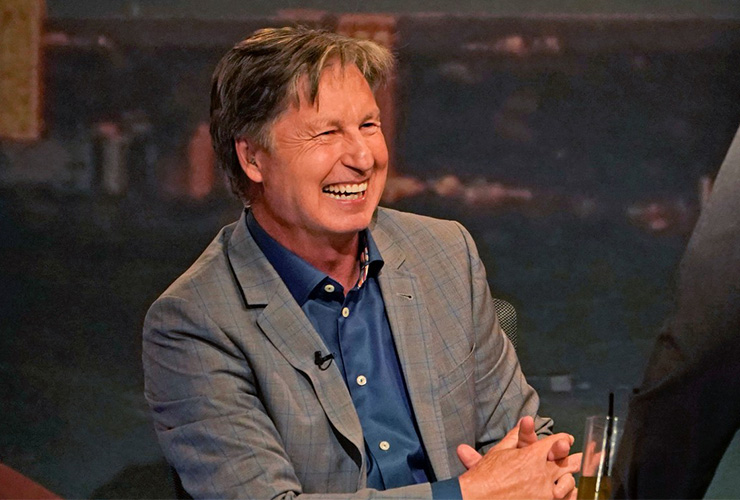By John Feinstein
Here’s the list of the five most important names in golf right now: Tiger Woods, Brooks Koepka, Rory McIlroy, Phil Mickelson and … Brandel Chamblee.
The first four have won 28 major championships and counting. Mickelson is already in the World Golf Hall of Fame, and the other three will join him as soon as they’re eligible.
And then there’s Chamblee, who won once on the PGA Tour—the 1998 Greater Vancouver Open, beating Payne Stewart by three shots—among four wins as a professional. Chamblee played in a total of 14 majors during his career, one fewer than Woods has won. Chamblee’s best major finish was a T-18 at the 1999 Masters, which he led after 18 holes in his first and only appearance.
If you compare Chamblee to 99 per cent of people who have ever played the game, he’s an absolute star. Thirteen years on the PGA Tour, including a win? Being able to tell his kids and grandkids that he led the Masters? Of course, that’s still a long, long way from the likes of Woods, Koepka, McIlroy and Mickelson.
And yet, I would make the case that Chamblee should join them in the Hall of Fame someday. He’s 57 and plays only in an occasional PGA Tour Champions event (he qualified the past two years for the Senior British Open). His legacy doesn’t have much to do with his prowess as a golfer. It has mostly to do with what happens almost every time he opens his mouth, whether it’s on Golf Channel—where he has worked for 16 years—or NBC or doing podcasts or making radio appearances.
When Chamblee speaks, somebody is likely to get upset. That might be an exaggeration, but not much. Here’s a quick list of those Chamblee has angered in recent years: Woods, Mickelson, an entire U.S. Ryder Cup team, David Duval (whom he shares a broadcast set with), Koepka and, most recently, Koepka’s dad, Bob Koepka.
Why? Because Chamblee has this nasty habit of speaking his mind and not worrying about whom he might offend. That’s why he is, without question, the most talked-about commentator in golf and, without question, the most criticized.
• • •
For the record, I consider Chamblee a friend. I worked with him at Golf Channel for nine years and enjoyed debating issues with him on and off the air. Some of the best television no one ever saw took place in the Golf Channel trailer during major championships.
There, late in the afternoon, Chamblee, Duval, Frank Nobilo and Ken Schofield (the former European Tour executive director turned commentator) would sit preparing for the evening show, watching the late players finish their rounds. I often found my way into the room after finishing my video essay for the next day. I did it in part because I wanted to hear what the ex-players thought about what was going on, but—being honest—more so because it was fun. The debates often grew heated, and with no cameras around, no one pulled any punches.

Rory McIlroy talks with Chamblee and the rest of Golf Channel’s “Live From” broadcast team after winning the 2019 Players Championship. (Chris Condon)
Brandel and I disagreed often, although I learned early that his knowledge of facts—golf-related or not—shouldn’t be questioned. On the final morning of the 2010 PGA Championship, I was talking on-air about the pressure players in contention feel on the final day of a major. “It reminds me of that famous Oscar Wilde line,” I said. “The mass of men lead lives of quiet desperation.”
“That’s a great description,” Brandel said. “Only I think it was Thoreau who said that.”
I was certain it was Wilde—I vividly remembered an ex-Congressman quoting it while explaining to me why he’d hidden the fact that he was gay his entire adult life. Brandel and I bet a dollar (thankfully that’s all it was), and we went to break.
Of course, Brandel, who got his degree at the University of Texas in speech communication and is an inveterate reader, was right. It was a great lesson in two ways: (1) Don’t trust ex-Congressmen to know what they’re talking about when quoting literature, and (2) Brandel Chamblee wasn’t your typical golfer.
A lot of players complain that Chamblee’s résumé as a player doesn’t entitle him to criticize Woods or McIlroy or Mickelson or Koepka. If one had to have a comparable résumé to those guys to critique their work, here’s the list of people currently alive who would have the right to do so: Jack Nicklaus, Tom Watson, Gary Player and Nick Faldo. When it comes to Woods, the list would be narrowed to Nicklaus.
But the whining about Chamblee isn’t so much about his playing record as it is about the fact that golfers—as a group—do not take criticism well. Golf is unique in that no one plays defence. The ball sits there, and you either get it in the hole fast enough or you don’t. In tennis, the other major individual sport, you can lose badly, shrug your shoulders and give the credit to your opponent. In golf, you miss the cut, it’s almost entirely on you. If you shoot 74 on Sunday and fade from first to fifth, it’s on you.
What’s more, the TV networks proudly promote the fact that they are partners with everyone in golf. The media covers golf; the TV networks partner with golf. That’s why, when an ex-player steps out of the gushy tones that dominate most TV coverage, players don’t take it well.
When Johnny Miller occasionally criticized shot selection on NBC or talked about the “choke factor” on Sundays (without ever singling out a player individually as a choker) players went crazy. Because Chamblee gets so much more airtime on the Golf Channel studio shows than Miller ever got, he is in position to criticize players far more often than Miller ever was.
I can tell you firsthand that no one does more homework before going on the air than Chamblee and his longtime partner Frank Nobilo.
Nobilo is often put in the role of sparring partner with Chamblee, and their on-air disagreements are genuine—but never get personal. I disagreed on-air with Chamblee at times, too, and it never got personal. The only on-air disagreement I witnessed that did get personal was when Brandel said before the 2016 Ryder Cup that the failings of the American team for the previous 20 years often came down to the failings of Woods and Mickelson.
Duval, who had played on Ryder Cup teams with both, became incensed at that comment, and it took a turn when Duval said on-air, “I know Brandel, you’re always right.”
When U.S. captain Davis Love III invited Duval into the team room that night, Duval got a standing ovation from the players for “standing up” to Chamblee on their behalf. Chamblee thought that Duval, at the matches in the role of a TV analyst, shouldn’t have accepted the invitation to go into the room. It took a while for the two men to sort out their differences.
I felt caught in the middle during that dispute—which I was obligated to write about in my book on that year’s Ryder Cup since it became part of the story. Brandel backed his position on Woods’ and Mickelson’s failings with a myriad of statistics. It wasn’t personal; it was the result of a good deal of research. Duval honestly believed that, without having played Ryder Cup, Chamblee couldn’t understand the pressures that came with it.
Neither man was wrong. Brandel was doing his job, and so was David. Brandel wasn’t wrong to point out that David’s presence in the team room might have crossed a line, but TV commentators are always being told to remember that they’re “partners” with the PGA Tour, all the players and all things golf.
• • •
Chamblee has had a running feud this year with the entire Koepka family. First, he questioned whether Brooks was tough enough to challenge Tiger Woods the way McIlroy and Dustin Johnson might. Then Chamblee criticized Koepka for losing weight for a magazine shoot. He also wondered if it was fair for Koepka to partner with his younger brother, Chase, who doesn’t have a PGA Tour card, in the team event at New Orleans. Shortly after that, Chamblee said he wasn’t ready to call Koepka a great player prior to the PGA Championship. Chamblee had to backpedal like a defensive back on that one throughout the week at Bethpage Black as Koepka won his fourth major title.
Recently, when Brandel jokingly posted a comment on Twitter about his wife, Bailey, wondering if he was “a man or a mouse” while he was deciding whether to go for the green over water from 245 yards out. Bob Koepka—father of Brooks and Chase—jumped on that to say, “And you question whether Brooks is tough?”
One player who gets what Chamblee does is McIlroy, who Chamblee has criticized for, among other things, spending too much time in the gym. On the morning of the last round of the 2016 Tour Championship, I sent McIlroy an early-morning text wishing him luck and was surprised to get a response right away because McIlroy had a late tee time. When I said, “I’m surprised you’re already up,” McIlroy wrote back: “Already been to the gym. But don’t tell Brandel.”
Later, I asked McIlroy about how he felt about Chamblee. “I like him,” Rory said. “I disagreed with what he said about my gym time, but that’s OK. I think he’s smart, and he’s always prepared.” McIlroy smiled. “You’re allowed to be wrong sometimes. We all are.”
Earlier that year, I thought Brandel was way off base when he criticized McIlroy for being dismissive of Olympic golf before the 2016 Open Championship. “When Rory McIlroy’s career is over, I think he may look back at that press conference as the worst moment of his career,” Chamblee said on-air that day. I texted Brandel right away, saying, “You don’t think he regrets Sunday at the 2011 Masters more than a comment in a press conference?”
“Got me on that one,” Chamblee responded.
The easiest thing in the world for those who talk about golf on TV is to be “good partners.” Chamblee doesn’t think that way. He says what he thinks—his “takes” are always true to beliefs and not made up for the sake of getting attention—and stands behind it, which is why even people who disagree with him are always listening when he’s talking.
I have heard everything he’s said in recent months defending the slow play and slow players. I couldn’t possibly disagree with him more. It’s OK, though. Like McIlroy says, everyone’s allowed to be wrong sometimes.
Thank goodness, Chamblee is willing to put himself on the line on a regular basis. Golf could use a lot more of him.









